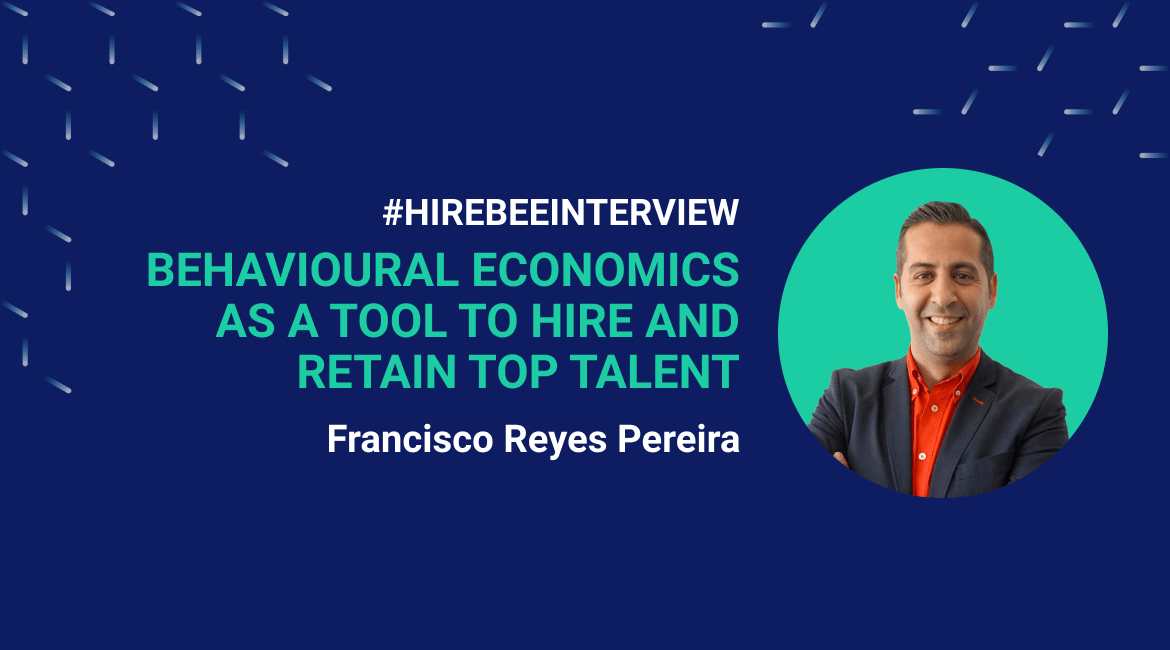Today we have invited Francisco Reyes to talk about Behavioural economics and how it is related to the human resources discipline. Thank you Francisco for accepting our invite.

“Persistence, grit, and cooperation define me. I’m a social entrepreneur and intrapreneur keenly curious about science, technology, and business. Knowing why people behave the way they do is one of my passions; the other is basketball. I’ve been Marketing & Project Leader for seven years, creating and developing consulting projects using neuroscientific techniques and Behavioral Economics methods.”
Table of Contents
ToggleWhat is behavioural economics? Why is it crucial for hiring and retaining talent?
Behavioral economics is a relatively new scientific discipline that comes to bring insights from many other sciences; neuroeconomics, neuroscience, psychology, sociology. It gathers all of these insights into one place, in this case into the science that observes human behavior – how people make decisions, how they behave, and why they behave the way they do.
It is an emerging new direction crucial, in my humble opinion, for human resources professionals, as it becomes more and more important to consider carefully the human side of our business in order to get the full landscape. The way talent acquisition managers measure important metrics, such as time-to-hire, quality of hire, cost of hire, etc; human resources leaders should start focusing on employee behaviour metrics, how they feel at the workplace, what will help them thrive and be happy, especially post-COVID.
Speaking of COVID, how can behavioral economics help combat the challenges that occurred due to covid? Does the role of behavioral economics become more important post-Covid, or does it go organically?
We see organic growth of practical application of behavioural economics. During recent years the interest towards this science has significantly grown, because of Richard H. Thaler, who won the Nobel Prize in 2017, and Daniel Kahneman won a Nobel Prize for his research in the field in 2002.
I think behavioural economics is here to stay, grow and provide everybody with a better understanding of how people behave. In my opinion, the role of behavioral economics post-Covid is key, because we are witnessing a huge behavioural change, so it is vital to understand where the change is headed. We need to understand where the hidden dynamics are in our organizations, in order to protect the culture, the energy and also manage the mental health issues of our employees.
For doing this, we need to have metrics to measure the success, shortfalls, gaps, and potential when it comes to our people.
In general behavioral economics can help companies have a better understanding of our people, as a consequence manage and become more flexible.
How can behavioural economics help the talent acquisition function?
Talking about talent acquisition, I think behavioural economics can help to foster diversity first. There are 3 stages, where behavioural economics can apply. The first one is candidate screening and BE can help to increase diversity in hiring, save time to do what is valuable in the organization. The second one is when you are in the interviewing process – this is a moment to understand the candidate more deeply. The final part is the onboarding process. That is the time when you are interacting with managers.
What’s the level of preparedness of modern organizations to implement behavioural economics?
The main problem with implementing behavioural economics for solving real-world problems is that organizations don’t quite understand how it can help the business. And while there is enough data, there is still a lack of structured approach to use it.
I think what we need is to educate organizations on how behavioural economics can help, what metrics they can set up and measure to better understand their people. From first sight, it seems quite complex and theoretical, but as soon as they define what aspects they need to improve, things will become more clear.
So if we look into the future, what is the future of behavioral economics in HR and particularly in talent acquisition
Behavioural economics can benefit the business by helping HR function to better understand potential candidates and existing employees, to better build processes that foster healthy corporate culture, understand what makes people happy and motivated, and why they leave the organization. And these are just a couple of practical applications.
Behavioural economics is so multilayered and so interesting. What would you suggest to professionals from related disciplines, who want to learn more about this science?
That is a great question. I think it is an ongoing process. First of all as a professional, one needs to be curious, one needs to put in practice curiosity to get out of the comfort zone, learn about different things because BE is different from many traditional industries, like HR or Finance. As a great author, I would suggest Richard Thaler. Also Daniel Kahneman’s book “Think fast, think slow” is a good start.
Any question that I didn’t ask you and you would still want to answer that?
I think the interview was quite comprehensive, covering many questions.
As a summary, I would add, that we need to spread this idea of putting people first. It is time to take care of people, be accountable for them, understand them better whether with or without the help of behavioral economics.
I still see some clumsy managers or leaders that are managing people in the wrong way, and sadly employees very often do not speak up against such things. A big HR community I am involved in is doing a lot to make organizations foster people first, so I think this is good progress. Covid shifted a lot of paradigms, one of them being our perception of work. Without flexibility and care for employees, businesses cannot have sustainable growth in the newly changed world.
I would like to sum up the interview with an interesting quote from Claude Silver – Chief Heart Officer of VaynerMedia – “People need people. People need people who listen, and people need people who listen and do something“.









